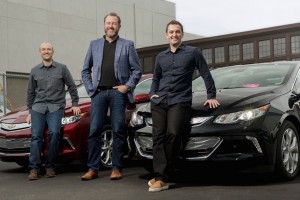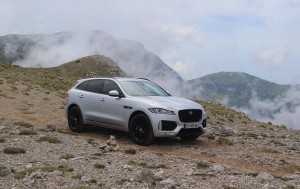Customers of ride-sharing service Lyft could be in for a pleasant surprise in the months to come: instead of the typical mainstream vehicle, they could find a more luxurious sedan or SUV pull up when they call for a ride.
British automaker Jaguar Land Rover will become the latest automaker to team up with Lyft, announcing Monday a $25 million cash investment and plans to provide a fleet of its vehicles to the ride-sharing service. JLR’s move comes a little more than a year after General Motors agreed to invest $500 million in Lyft and create a special lease program for the service’s drivers.
The partnership with Jaguar Land Rover comes at a time when Lyft is making an aggressive push to catch up to key rival Uber, taking advantage of a series of problems that have hammered the bigger ride-sharing service in recent months.
(Uber CEO Travis Kalanick may take leave of absence. Click Here for the story.)
the Lyft-JLR project creates “a real-world platform helping us develop our connected and autonomous services,” said Sebastian Peck, managing director of Jaguar Land Rover’s mobility services unit InMotion Ventures.

Lyft founders Logan Green, left, and John Zimmer, right, shown with GM President Dan Ammann after inking a $500 mil partnership last year.
While ride-sharing and car-sharing services currently account for only a small share of the roadway travel Americans clock each year, they are expected to gain significant ground in the coming decades. A study released earlier this year by Boston Consulting Group forecast that nearly a third of the miles Americans travel by 2030 will be in electrified, autonomous vehicles operated by ride-sharing services. The tech consultancy RethinkX expects that figure to be more like 95%.
While there are a number of uncertainties in such forecasts, even skeptics anticipate ride-sharing will gain significant momentum over the coming decade, especially in large and mega-cities around the world. Lyft currently operates in 300 cities, adding 100 of those since the beginning of 2017.
It is widely believed that the growth of ride-sharing will translate into lower retail car sales, one reason automakers like JLR and GM are partnering with Lyft. Toyota, Ford, Volkswagen and other manufacturers have partnered with competing services such as Uber and Gett.
Mark Fields, former CEO of Ford and an active proponent of alternative mobility services, estimated that some of the sales lost on the retail side would be made up by greater ride-sharing business – since those vehicles would clock substantially more mileage each year than privately owned automobiles.
Lyft will use the JLR cash to help develop its autonomous vehicle capabilities. Like Uber, Lyft’s senior management is betting that it will be able to eventually push the driver out of the vehicle, driverless cars bringing the price of a ride down significantly.

Lyft has been trying to take advantage of the problems faced by rival Uber and its CEO Travis Kalanick.
In the meantime, the partnership with JLR will make “a fleet” of Jaguar and Land Rover products available to Lyft drivers who might not want to use their own automobiles. Specific terms haven’t been announced, but speculation centers around the possibility those luxury vehicles will be offered with cut-rate leases, similar to what Lyft is now doing with some GM products.
InMotion already has an indirect relationship with Lyft. It previously invested in Detroit-based SPLT. That carpool service works with Lyft to provide non-emergency medical transportation.
(Lyft teams up with nuTonomy on autonomous vehicle development. Click Here for the story.)
Lyft has a current valuation of just $7 billion, compared to $60 billion for Uber, and it focuses primarily on the U.S. market. But the smaller service has been gaining ground on its rival, in part because of the spate of bad publicity that has hammered Uber in recent months.
Over the weekend the Uber board of directors agreed to all of the recommendations made by former U.S. Attorney General Eric Holder following a probe into allegations of sexual harassment at the company. Separately, CEO Travis Kalanick is reportedly seeking to either take a leave of absence or sharply reduce his role at the company.
Among the other problems facing Uber is a lawsuit filed by Google spinoff Waymo alleging the ride-sharing service illegally accessed the company’s autonomous vehicle technology.
Last month, Lyft announced a partnership with Waymo to help speed up its own self-driving vehicle program. It is also working with Boston-based nuTonomy on driverless car testing.
(Uber fires exec accused of stealing documents from Waymo. Click Here for the latest.)

